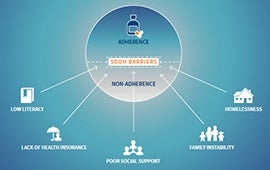The Role of the Pharmacist in Patient Engagement
Healthcare delivery is transforming retail pharmacies and the role of the pharmacist in patient engagement.
As healthcare delivery continues to evolve in the U.S., the pharmacy community has the ability to become more than just the place where prescriptions are filled. Many pharmacists are already assuming the role of provider and utilizing patient engagement solutions to ensure medication adherence.
Pharmacists are now involved in meaningful patient engagement to help improve their patients’ health through better management of certain conditions and prescription therapies. Pharmacies function in this dual role because they are often the most readily available healthcare provider. But this dual role puts a strain on retail pharmacies – they must balance patient engagement while maximizing reimbursements and ensuring compliance.
The patient already sees the pharmacy of the future. With flu shots and other immunizations, as well as mini-clinics where physicals and other health needs can be met, patients are engaging with the pharmacist in ways that were not possible decades ago. The pharmacy is evolving past the traditional interaction of picking up prescriptions and medications. The future pharmacy is here now and retail pharmacies are adapting to this patient centric approach. Transforming a pharmacy to produce better outcomes hinges on three crucial steps: ensuring patient data integrity, transforming that patient data into insights, and validating prescriber information in the workflow at point of service to maximize reimbursements and enable compliance.
pharmacist in ways that were not possible decades ago. The pharmacy is evolving past the traditional interaction of picking up prescriptions and medications. The future pharmacy is here now and retail pharmacies are adapting to this patient centric approach. Transforming a pharmacy to produce better outcomes hinges on three crucial steps: ensuring patient data integrity, transforming that patient data into insights, and validating prescriber information in the workflow at point of service to maximize reimbursements and enable compliance.
The pharmacy of the future is here now. Retail pharmacies must adapt to this new model using data insights that aid patient engagement at point of service. That insight includes using a unique patient identifier (UPI) to help increase the appropriate sharing of patient data, improve patient record linking between disparate data sources and prevent medical errors. Pharmacies must also consider the implementation of social determinants of health (SDOH) data and insights to improve medication adherence, leading to overall better health outcomes.



